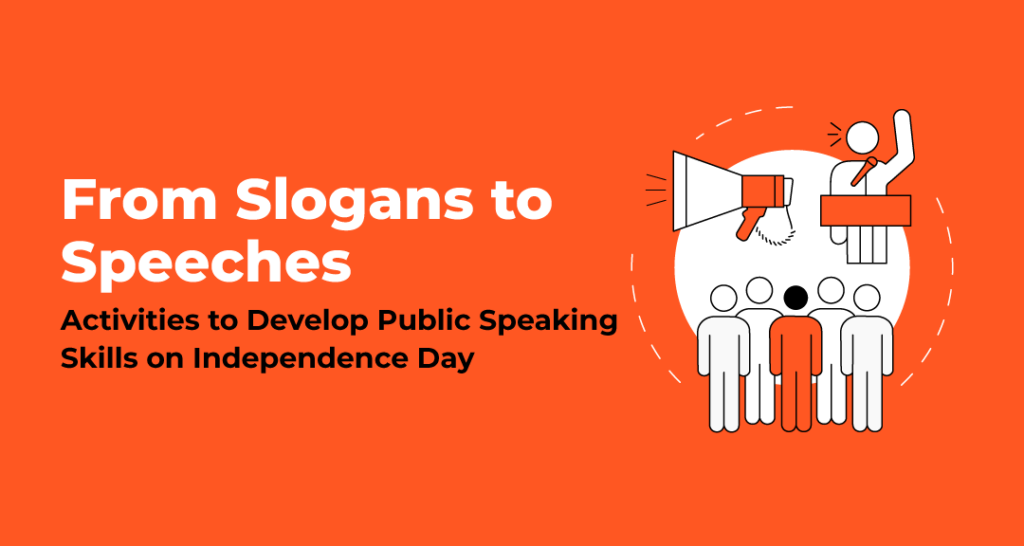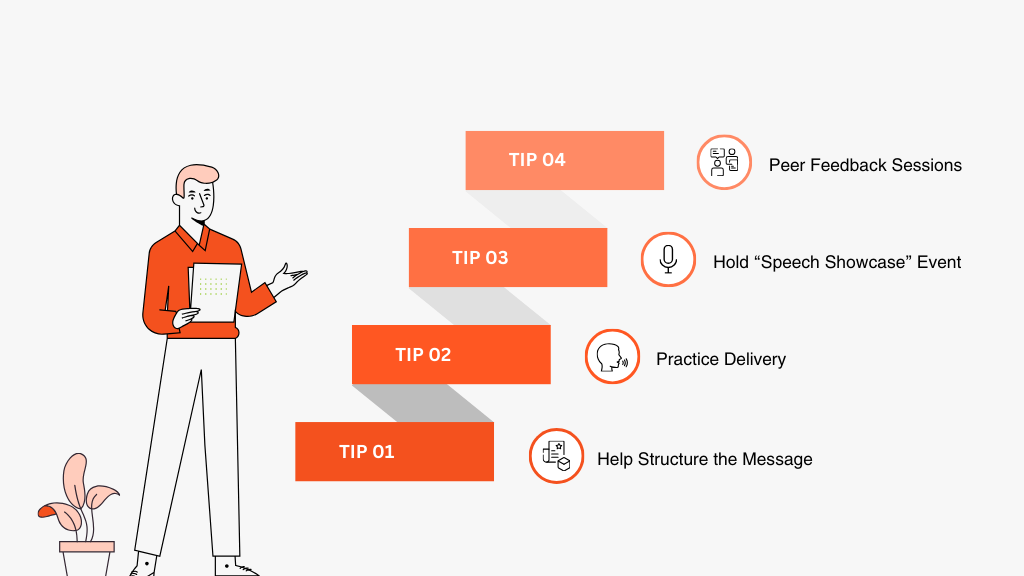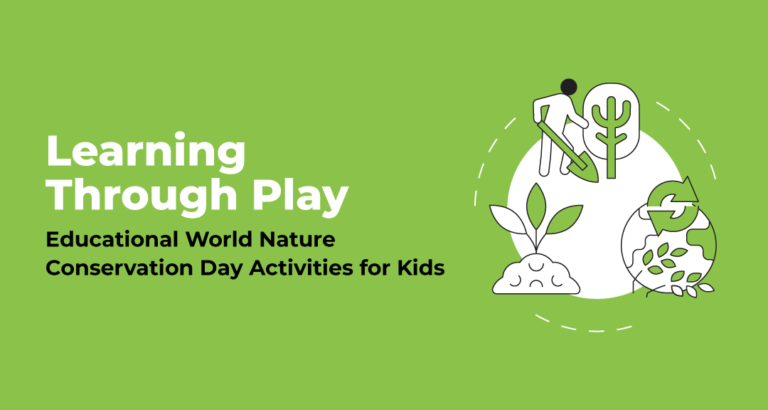From Slogans to Speeches: How to Develop Public Speaking Skills on Independence Day
- Teaching
- August 10, 2024
- VOLT Learning

Independence Day celebrations always hold a special significance in a student’s tapestry of memories. More than just a date on the calendar, it’s a day packed with umpteen unforgettable moments that ignite in their young hearts a deep sense of patriotism and love for the nation.
A typical day of Independence Day celebration on 15th August morning at school often has pleasing sights of children in all-whites quietly watching the tricolor flag unfurl, waving it, singing the national anthem, enthusiastically marching to the drumbeat, paying homage to freedom fighters, and performing cultural dance and patriotic plays.
This is the day when children develop true patriotic sense with the echoes of Jana Gana Mana and Vande Mataram followed by memorable storytelling sessions on the bravery and sacrifice of our forefathers.
To spark the spirit of patriotism in youth, the 15th August ceremony always hinges on storytelling sessions, debates and speech competitions. All these activities encourage public speaking, which in particular, carries special weight as it involves thoughtful discussions to enlighten young minds about the hardship of freedom, and expression of thought.
Public speaking and debating at a school assembly are instrumental in nurturing in the children the ability to speak confidently and helping them overcome stage fear and communicate their ideas persuasively.
However, for many, the thought of standing up and speaking in front of others can be daunting. That’s why we’re here to help you master public speaking skills and make your Independence Day speech memorable.
Interactive Activities to Develop Public Speaking Skills
Building strong public speaking skills doesn’t happen overnight. It is a journey that involves continuous practice, along with creative activities, motivating the participants to step out of their comfort zone and put their point of view across to a large audience self-assuredly.
To be able to master the skill of public speaking, a student should take into account the following factors:
- Confidence as public speaking entails a high degree of conviction and enables to command the attention of the audience;
- Clarity by allowing speakers to communicate complex thoughts with greater fluency and articulate the vocabulary while speaking;
- Engagement by establishing a strong connection with the audience via eye contact, body language, facial expressions, and gestures elevating the engagement quotient;
- Preparation as having a well-prepared and structured content logically is key to a good public speaking session;
- Pacing wherein speakers know where to pause during the speech and give time to the audience to catch up without getting bored;
- Authenticity by staying true to oneself that converts into strong trust with the audience.
Public speaking is the true game-changer for students to build confidence, improve articulation, and develop a sense of leadership while delivering their messages effectively. Here are some hands-on exercises that can make the learning process both fun and impactful.
1. Slogan Writing
Write powerful and catchy phrases that describe the Independence Day’s topic appropriately. Remember slogans are brief memorable statements that need to be conveyed in a clear and innovative way.
So, a speaker must practice the skill of converting complex ideas into impactful messages in such a way that the speaker resonates with the audience. Slogan writing helps in improving persuasive abilities, enhances a sense of rhythm while speaking, and sharpens critical thinking skills, which are important for effective oral communication.
2. Debate Sessions
Debate sessions are transformative during the journey towards developing and refining public speaking skills. Through structured discussions, such sessions can encourage speakers to face the crowd and speak confidently by articulating complex thoughts clearly, and proactively address opposing viewpoints.
Regular engagements in debates help individuals in sharpening their analytical skills, construct well-reasoned arguments, anticipate counterarguments, improve responsiveness in communication, and foster adaptability.
Additionally, such exercises provide a supportive environment to practise voice modulation, pacing, and demonstration of appropriate body language. These are all crucial elements of impactful oration while cultivating active listening skills through a participant’s exposure to diverse perspectives of their opponents. Consequently, They are able to overcome the stage anxiety that many speakers supposedly feel when they are under pressure.
3. Speech Writing and Delivery
Speech writing and delivery are essential components of effective public speaking. One of the essential objectives of any speech is to create a coherent and logical orientation of the speakers’ thoughts in order to present them comprehensively. This preparation helps in eliminating anxiety so that the speakers deliver the intended message in a manner that will capture the audience’s attention.
To the audience, it provides an opportunity for better understanding of a speech and its content, making the process thoroughly enjoyable. These twin advantages of speech writing and delivery are of great assistance in public speaking business ventures.
4. Storytelling Circle
As a fundamental tool of communication, this activity sharpens the narrative skills of the students and prepares them to engage with their audiences emotionally and intellectually.
Additionally, storytelling is pivotal in improving creative thinking, expressive delivery, voice modulation and active listening skills as students learn from one another’s stories.
For the occasion of Independence day, teachers can engage students in a circle and ask each student to articulate a short story or anecdote pertaining to the Independence Day.
5. Impromptu Speaking
Impromptu speaking, as the name indicates itself, is the most effective technique that speakers can rely on to develop the skills of quick thinking and adaptability.
This technique engages speakers in many real-world speaking situations without any prior extensive preparation, and helps students ace their critical-thinking capabilities, while letting them overcome the fear of unexpected speaking scenarios. During impromptu speaking, participants have to organize their thoughts and construct a message spontaneously.
By integrating these interactive activities into your classroom, you can help students develop and refine their public speaking skills, making them more confident and capable speakers, with the readiness to deliver an inspiring Independence Day speech or any public address.
Quick Guiding Tips for Teachers to Nurture Public Speaking Skills

Teachers play a crucial role in helping students develop their public speaking skills. Here are some tips for them to guide students as they prepare for their Independence Day speeches:
1. Help Structure the Message
Teachers should encourage students to make use of attention-grabbing introductions having a well-arranged beginning and a memorable conclusion. They must educate students about how they should connect different points so there is a smooth narrative flow from one point to another. They can ask students to divide the message into multiple segments because a well-structured speech lets the participant win half the battle by making a better impression.
2. Practise Delivery
Organize a forum where students can rehearse their speeches in front of an audience with minimal interference. Pay particular attention to aspects like intonation, pacing, volume and non-verbal communication. Explain to them about the importance of multiple rehearsals, both individual and in front of fellow students. Repetition instills confidence, reduces the speaker’s nervousness and boosts self-assurance.
3. Hold a “Speech Showcase” Event
Arrange a “Speech Showcase” in which students can speak in front of fellow learners, teachers and even parents. Appreciate their hard work and efforts, and give a positive feedback. A showcase is useful as students get an opportunity to exercise their speaking skills in a live context, which is helpful and enriching.
4. Organize Peer Feedback Sessions
Foster a positive criticism after the completion of the speeches or debates sessions, and let the participants assess one another’s work. This exercise of positive feedback will help students improve critical areas like clarity, confidence and interactions. Additionally, peer feedback unboxes different viewpoints of fellow speakers on a particular work, making students realize what they are good at and where they need improvement while fostering a positive atmosphere.
Conclusion: Empowering Students for Independence Day
Mastering public speaking is a journey. However, with the right guidance and practice, anyone can deliver a powerful Independence Day speech with confidence. By engaging in interactive activities like slogan writing, debates and structured speech practice, students can develop the skills they need to communicate their ideas effectively.
Teachers too, play a vital role in this process, as reliable channels of support and feedback necessary to help students thrive. As Independence Day is approaching, let’s embrace the opportunity to not only celebrate our nation’s freedom but also to blaze the trail for the next generation of confident, eloquent speakers to come forward and exhibit their skills.
So, take these tips to heart, practise diligently, and get ready to deliver a speech that will inspire and resonate with your audience on this special day!



